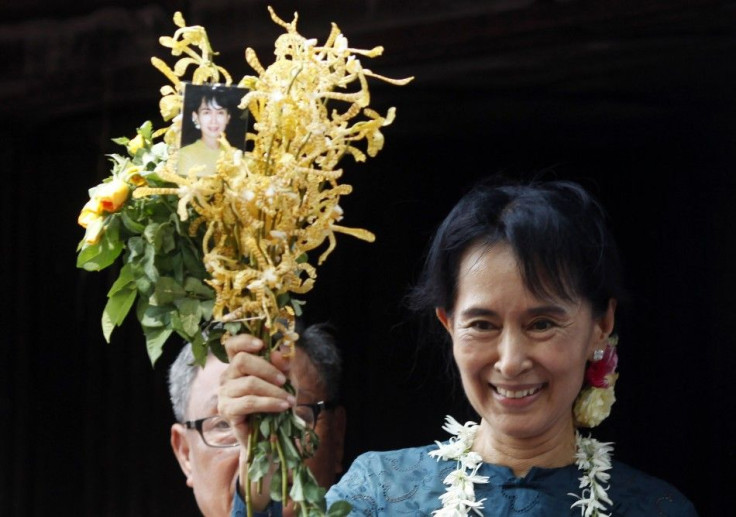After 24 Years In Myanmar, New Doors Open For Aung San Suu Kyi

When Aung San Suu Kyi left her husband and children in England to visit her ailing mother in Myanmar 24 years ago, she never imagined that she'd be stuck inside the Southeast Asian country for 24 years.
Now, according to Reuters, she will leave Myanmar for the first time since returning there in 1988. Suu Kyi recently accepted an invitation to next week's World Economic Forum on East Asia in Bangkok, Thailand. She is also scheduled to accept an honorary doctorate from Oxford University, her alma mater, on June 20. While in London, she will address the British Parliament.
Suu Kyi, who was born in Myanmar (then Burma), was the daughter of the famous General Aung San, a hero in the country's struggle for independence from Britain. The general was assassinated when Suu Kyi was only a toddler, but her mother Khin Kyi stayed in the political sphere.
When Khin Kyi was appointed the Burmese ambassador to India in 1960, a teenage Suu Kyi went with her to New Delhi. In 1964, she was 18 and ready to attend university. She elected to study philosophy, politics and economics at Oxford University.
It was there she met her husband, a fellow academic named Michael Aris. The two shared a lifelong interest in Southeast Asian politics, and eventually settled down to raise a family.
After living for over a decade in England with her husband and giving birth to two sons, Suu Kyi learned that her mother had fallen ill. She scheduled a flight to her home country, expecting to return soon to her family.
Suu Kyi was in Myanmar through December of 1988, when her mother passed away. But the young activist decided not to return to England just yet.
Face Of Oppposition Movement
Swept up in Myanmar politics, where a military junta had controlled the country since 1962, the daughter of an independence hero became the face of a growing opposition movement. She waged a campaign of peaceful resistance against the dictatorial leader General Ne Win and his oppressive junta, traveling throughout the country to organize rallies and call for fair elections. She became the leader of the National League for Democracy (NLD), which swept a parliamentary vote in 1990. But the military seized power following the election, and the popular Suu Kyi was placed under house arrest.
Years went by. While she was detained in Myanmar, her two adolescent sons matured into adulthood. The elder son, Alexander, was a teenager when he accepted the Nobel Peace Prize on his mother's behalf. He said at the ceremony that Aung San Suu Kyi has come to be a worthy symbol through whom the plight of all the people of Burma may be recognized. The younger brother, Kim, also spoke frequently about his mother, even getting a tattoo of the NLD flag on his arm.
Then, in 1997, Suu Kyi's husband was diagnosed with terminal prostate cancer.
At that point, Aung San Suu Kyi had been temporarily freed from house arrest. Myanmar officials even encouraged her to visit her ailing husband, but the political activist decided to stay put.
Regretfully, she refused the government's offer and the discussion abruptly ended with the officers [told] to leave her residence, said a government spokesman to the BBC in 1999. She feared that she would not be allowed to return to Myanmar, and knew that her presence there was instrumental in continuing the resistance movement.
Aris applied for a visa to visit his wife before his death, but was repeatedly refused by the Myanmar government. He died in 1999, on his 53rd birthday.
Following repeated incarcerations and prolonged periods of house arrest, Suu Kyi was finally freed for the last time in 2010.
Myanmar: Slow Liberalization Process
Myanmar is now slowly liberalizing under President Thein Sein, a process that accelerated when recent parliamentary elections resulted in a sweeping victory for the NLD. Though a military junta still holds significant power over the government, the election marked a milestone in Myanmar's democratization.
Suu Kyi and her many supporters are still fighting for greater political transparency and market openness. Myanmar has been the subject of renewed international attention and praise in recent months -- it was only a matter of time before the country's most ardent activist would be invited to bring her message of peace beyond Myanmar's borders.
For Suu Kyi, the decision to fight for the people of Myanmar came at a high personal cost. With her husband gone and her sons grown, there is little for her to return to in England. Justice for Myanmar has become her driving cause and ultimate passion.
Now stepping beyond those borders for the first time in so many years, Suu Kyi can look forward to a warm welcome from members of the international community. Her ultimate goal is the same one that has driven her through all those years of repression and detainment -- but now, her sphere of influence is growing even wider.
--
© Copyright IBTimes 2024. All rights reserved.






















